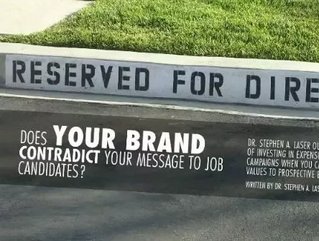Does Your Brand Contradict Your Message to Job Candidates?

Click here to read this article on our interactive reader in the July issue of Business Review USA!
Written by Dr. Stephen A. Laser
How ironic it is when the brands and images companies try to promote fly in the face of the messages they send to prospective job applicants. Organizations spend thousands—in some cases, millions—of dollars to promote these images to the public in the hopes that their efforts will translate into greater revenues. While companies are to be commended for promoting their brands, all of their attempts at improving their image can be negated by sending mixed message to the people who are seeking job openings at their places of employment.
Many organizations have mission statements setting forth the values the company supports along with the kind of corporate culture the company is seeking to convey. But what happens when those mission statements contradict reality? For example, how many companies speak of treating their associates as individuals who will be treated fairly and equally, without distinctions being made between people at different levels in the organization? Yet, when the prospective job applicant pulls into the company parking lot for his or her initial job interview, they observe a parking space hierarchy. And those that are held apart for the executive team contain luxury cars far more costly and expensive than what populates the rest of the lot.
Another example can be found in the common company’s claim to be “customer-centric.” Even beneath the buzzwords and business-speak, customers and clients are the lifeblood of any business. But what does it say about that image of customer service when a poor job applicant is left sitting in the lobby or waiting area for an hour or more before anyone comes out to greet them for their day of on-site interviews? Even if the candidate meets with prospective colleagues as scheduled, how many organizations touting a “passion for delighting their customers” don’t even have the common courtesy to notify the applicant about his or her job status after the person has spent valuable time meeting with representatives at the company? What does it take to send a simple email or make a quick phone call to let an applicant know where he or she stands in the hiring process? Companies should know that a dissatisfied job applicant can become a disgruntled customer.
If every mention of the term “team-oriented” were worth a dollar, one might be able to retire after reviewing a stack of business marketing brochures. Just like “strong customer service orientation”, “teamwork” is another overused buzzword. Many of the so-called team-focused organizations still implement compensation systems that primarily reward individual performance with little leeway to reward the group for its overall contribution to the success of a project. In many instances, this situation is changing, but before a company touts itself as team-oriented, it might make sure it is not sending mixed messages.
There are obviously other glaring examples of the contrast between what is promoted to the public as part of a company’s image and the realities of corporate life. Employee development is quite frequently pushed to potential new hires as a reason for signing on with the company. But in today’s economic environment, with cost-cutting and austerity dominating boardroom discussions, tuition reimbursement programs have become a thing of the past. Hence, it will be hard for those individuals who want to finish their college degrees or seek a master’s or advanced degree to enhance their job skills.
It is important to pay attention to the potential for mixed messages. Although there is no doubt that high unemployment rates have made the job market a buyer’s (or employer’s) market, excellent job candidates will always be worth pursuing. Moreover, nothing lasts forever, so when the economy improves and hiring demand picks up steam, the organizations that have their corporate images and values in alignment with their day-to-day ways of doing business will be the most triumphant.
About the Author: Stephen A. Laser, PhD has over 30 years of experience as a business psychologist. He founded and manages a Chicago-based consulting firm specializing in advising clients on hiring employees. Over the past 10 years, Dr. Laser has been a guest speaker to various groups of unemployed individuals, typically over the age of 40, and previously taught university courses in business psychology. Dr. Laser is the author of Out-of-Work and Over-40: Practical Advice for Surviving Unemployment and Finding a Job.
- The best and worst technology company rebrands in historyLeadership & Strategy
- Why your recruitment process must be more thoughtful in 2023Human Capital
- Why organisations are rebranding in a new era of businessLeadership & Strategy
- Apple, Amazon, Google named world’s most valuable brandsTechnology & AI






